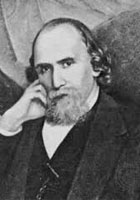Henri Frédéric Amiel
Henri Frédéric Amiel Poems
' Petite perle cristalline
Tremblante fille du matin,
Au bout de la feuille de thym
Que fais-tu sur la colline ?
...
Henri Frédéric Amiel Biography
Henri Frédéric Amiel (27 September 1821 – 11 May 1881) was a Swiss philosopher, poet and critic. Born in Geneva in 1821, he was descended from a Huguenot family driven to Switzerland by the revocation of the Edict of Nantes. After losing his parents at an early age, Amiel travelled widely, became intimate with the intellectual leaders of Europe, and made a special study of German philosophy in Berlin. In 1849 he was appointed professor of aesthetics at the academy of Geneva, and in 1854 became professor of moral philosophy. These appointments, conferred by the democratic party, deprived him of the support of the aristocratic party, which comprised nearly all the culture of the city. This isolation inspired the one book by which Amiel is still known, the Journal Intime ("Private Journal"), which, published after his death, obtained a European reputation. It was translated into English by Mary A. Ward at the instigation of Mark Pattison. Although modest in volume of output, Amiel's mind was of no inferior quality, and his Journal gained a sympathy that the author had failed to obtain in his life. In addition to the Journal, he produced several volumes of poetry and wrote studies on Erasmus, Madame de Stael and other writers. He died in Geneva.)
The Best Poem Of Henri Frédéric Amiel
Petite Perle Cristalline
' Petite perle cristalline
Tremblante fille du matin,
Au bout de la feuille de thym
Que fais-tu sur la colline ?
Avant la fleur, avant l'oiseau,
Avant le réveil de l'aurore,
Quand le vallon sommeille encore
Que fais-tu là sur le coteau ? '
Henri Frédéric Amiel Comments
Henri Frédéric Amiel Quotes
Thought is a kind of opium; it can intoxicate us, while still broad awake; it can make transparent the mountains and everything that exists.
In every loving woman there is a priestess of the past—a pious guardian of some affection, of which the object has disappeared.
It is by teaching that we teach ourselves, by relating that we observe, by affirming that we examine, by showing that we look, by writing that we think, by pumping that we draw water into the well.
Self-interest is but the survival of the animal in us. Humanity only begins for man with self-surrender.
An error is the more dangerous in proportion to the degree of truth which it contains.
If nationality is consent, the state is compulsion.
The man who insists upon seeing with perfect clearness before he decides, never decides. Accept life, and you must accept regret.
Uncertainty is the refuge of hope.
Our systems, perhaps, are nothing more than an unconscious apology for our faults—a gigantic scaffolding whose object is to hide from us our favorite sin.
To do easily what is difficult for others is the mark of talent. To do what is impossible for talent is the mark of genius.
Common sense is the measure of the possible; it is composed of experience and prevision; it is calculation appled to life.
Without passion man is a mere latent force and possibility, like the flint which awaits the shock of the iron before it can give forth its spark.
Blessed be childhood, which brings down something of heaven into the midst of our rough earthliness.
Cleverness is serviceable for everything, sufficient for nothing.
Action is only coarsened thought—thought becomes concrete, obscure, and unconscious.
